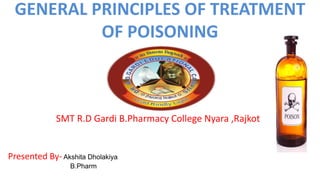
GENERAL PRINCIPLES OF TREATMENT OF POISONING
- 1. GENERAL PRINCIPLES OF TREATMENT OF POISONING SMT R.D Gardi B.Pharmacy College Nyara ,Rajkot Presented By-Akshita Dholakiya B.Pharm
- 2. Content Introduction Classification Measures to be taken during poisoning treatment Specific Antidotes
- 3. INTRODUCTION • Poison : it refers to any substance injected into living body by any means (oral, i.v , inhalation, dermal) causes local or systemic effects or even both results in illness and also leads to death of individual. • The word poison has been derived from Latin word potare which means to drink. • Poison is any substance (solid, liquid, gas) that impairs the normal physiology of body to kill or injure through its chemical actions.
- 6. Measures to be taken during poisoning treatment • Attention must be paid to the airway , breathing , circulation and depression of CNS (the ABCD of resuscitation). 1) Poison identification : depending on the sympotoms the poison and other factors affecting the condition must be identified. 2) Ensure proper ventilation : tidal volume of around 400 ml and diminutive volume around 4 liters/minute. Under ventilation may cause hypoxemia and over ventilation may lead to hypotension. 3) Suppression of convulsion : in the case the poisons cause convulsion and are not controlled by satisfactory ventilation, diazepam 10mg iv must be given.
- 7. 4)Fluid and electrolyte therapy: the aim is expansion of circulating blood volume and restoration of venous return and cardiac output. For this isotonic saline (0.9 %) isotonic glucose (5%) or plasma may be used. 5)Prevention of further absorption: i. From the environment: when a poison has been inhaled or absorbed through the skin the patient should be removed from toxic environment the contaminated clothing should be removed and skin should be cleaned. ii. From the gut: • Oral absorbents: activated charcoal (carbomix, medicoal) reduce drug absorption . Easier to administer and fewer adverse effects
- 8. • Gastric lavage : this involves removal of unabsorbed poison from the stomach.
- 9. • Emetics: 15gm of sodium chloride is dissolved in a glass of water band given to make the patient vomit. The dose is repeated till the vomit is clear. • Cathartics: cathartics or whole bowel irrigation is used for the removal of sustained release formulations. 6) Specific antidotes: these should be given in case of any specific type of poisoning. • Antidote is a medicine taken or given to counteract a particular poison.
- 10. Some drugs and its specific antidotes
- 11. Reference • Essential of medical pharmacology by K.D tripathi 8th edition • A text book of pharmacology – by dr.S.B.bhise Nirali prakashan • Review of pharmacology by sparsh gupta 12th edition